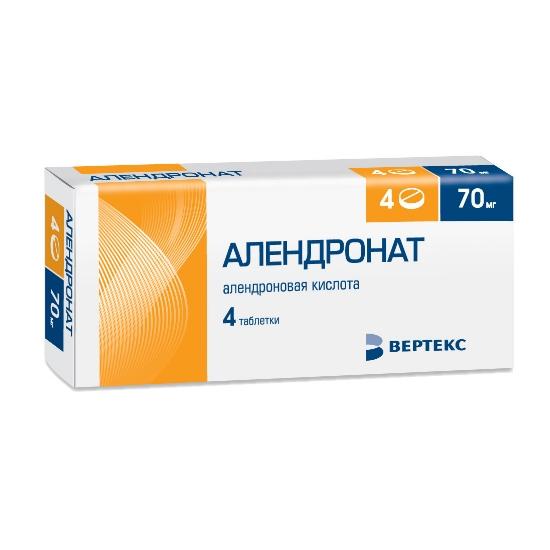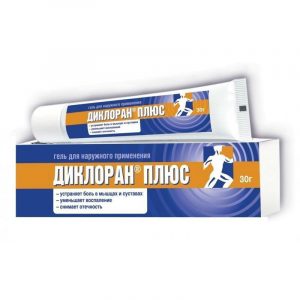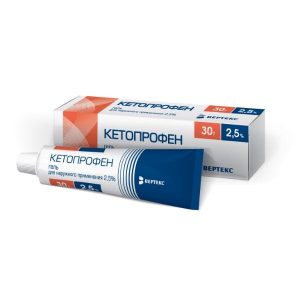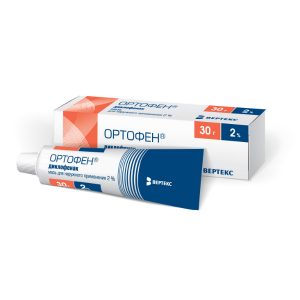Description
Release form
Tablets
packaging 4 pcs
Pharmacological action
Alendronate – an inhibitor of bone resorption.
Aminobisphosphonate, is an analogue of pyrophosphate.
The mechanism of action is associated with the suppression of osteoclast activity.
Restores a positive balance between bone resorption and restoration, progressively increases bone mineral density (regulates calcium-phosphorus metabolism), and promotes the formation of bone tissue with a normal histological structure.
Indications
– osteoporosis in postmenopausal women (prevention of bone fractures, including thigh and spine)
– osteoporosis in men
– osteoporosis caused by prolonged use of glucocorticosteroid drugs Paget’s disease.
Contraindications
– hypersensitivity to the components of the drug
– hypocalcemia
– patient’s inability to stand upright (to stand or sit upright) for at least 30 minutes srdlp – renal failure (creatinine clearance less than 35 ml / min)
– severe disturbances in mineral metabolism
– strictures or achalasia of the esophagus and other conditions that lead to difficulty in moving food through the esophagus
– severe hypoparathyroid oz
– calcium malabsorption
– lactose intolerance, lactase deficiency, glucose-galactose malabsorption
– pregnancy
– lactation period
– childhood.
Precautions
Diseases of the gastrointestinal tract (GIT) in the acute phase (dysphagia, esophagitis, gastritis, duodenitis, peptic ulcer and 12 duodenal ulcer), vitamin D. deficiency
Special instructions
Absorption of bisphosphonates is significantly reduced while eating.
To reduce the irritating effect on the esophagus, Alendronate must be taken immediately after the morning rise, washed down with a full glass of water. After admission, you should be in an upright position (standing or sitting) for 30 minutes (it is dangerous to use the drug if the patient is unable to stand or sit straight for the specified time). Taking Alendronate at bedtime or in a horizontal position increases the risk of developing esophagitis.
The patient should be informed about the need to stop taking Alendronate and see a doctor if dysphagia develops, pain when swallowing, pain in the sternum or if heartburn occurs.
With hypocalcemia, it is necessary to correct it before starting treatment. In particular, it is necessary to eliminate disturbances in mineral metabolism leading to hypocalcemia (vitamin D deficiency, hypoparathyroidism, calcium malabsorption). Therapy should be carried out against a background of a diet enriched with calcium salts.
When taking bisphosphonates (especially with concomitant therapy with glucocorticosteroid drugs), it is necessary to ensure the intake of adequate amounts of calcium and vitamin D with food or in the form of medicines.
During treatment, due to the positive effect of alendronic acid on the bone mineral density, a slight asymptomatic decrease in the concentration of calcium and phosphate in the blood serum can be observed.
Before prescribing bisphosphonate therapy to patients with concomitant risk factors (e.g. cancer, chemotherapy, radiation therapy, taking glucocorticosteroid drugs, insufficient oral hygiene) it is necessary to undergo a dental examination with appropriate preventive dental treatment. Patients treated with bisphosphonates should avoid invasive dental procedures whenever possible. Jaw osteonecrosis has been reported, usually associated with tooth extraction and / or local infection (including osteomyelitis) in cancer patients who received intravenous bisphosphonates (many of them were also prescribed chemotherapy and glucocorticosteroid drugs). There are reports of the development of jaw osteonecrosis in patients with osteoporosis with oral bisphosphonates.
In patients with jaw osteonecrosis and undergoing bisphosphonate therapy, dental surgery may worsen the condition. If surgical interventions are necessary, it should be borne in mind that there is no data on the possibility of reducing the risk of developing jaw osteonecrosis after bisphosphonate withdrawal.
Prescribing and recommendations of the attending physician should be based on an individual assessment of the benefit / risk ratio for each patient.
Composition
1 tablet contains:
Active ingredient:
alendronic acid 70 mg
Excipients:
starch ,
MCC.
Dosage and administration
Alendronate is administered orally, 1 time per day, without chewing, on an empty stomach, preferably 2 hours (but not less than 30 minutes) before the first meal, water or other medications. It should be washed down with plain water only, as other drinks, including mineral water, coffee, tea, orange juice) reduce absorption. Do not chew or dissolve tablets.
The recommended dose is 1 tablet (10 mg) by mouth once a day or 1 tablet (70 mg) by mouth once a week.
For the treatment of osteoporosis in women (in postmenopausal women) and in men, as well as osteoporosis, caused by prolonged use of glucocorticosteroid drugs, Alendronate is taken at 10 mg / day. or 70 mg once a week.
For Paget’s disease, it is used at a dose of 40 mg / day for 6 months. If you accidentally skip taking the drug once a week, you need to take one tablet in the morning of the next day. You should not take two tablets on the same day, but in the future you should continue to take one tablet on that day of the week that was selected for admission from the very beginning of treatment.
Storage conditions
Keep out of the reach of children at a temperature not exceeding 25 ° C.
Expiration
2 years
Deystvuyuschee substances
Alendronovaya acid
Terms and conditions
prescription
dosage form
tablets
Appointment
For women in menopause, For women in menopause, for women nopause, Adult doctor’s appointment
Vertex, Russia




